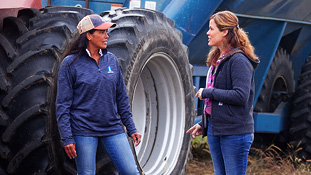How does Section 179 work?
Originally enacted in 1958, Section 179 deductions and bonus depreciation were created to encourage business investment. Today, farmers can deduct the full purchase price of a business asset like a tractor or combine from gross income. The 2023 cap for the total amount written off through Section 179 is $1.16 million for equipment purchases totaling $2.89 million. Anyone considering Section 179 should consult with their Tax professional before making any decisions.
Depreciation
Separate from Section 179, the Tax Cuts and Jobs Act (TCJA) created additional first year depreciation, or bonus depreciation. This provides farmers another way to accelerate depreciation in the first year of owning eligible machinery or equipment property placed in service prior to January 1, 2027.
According to a U.S. Treasury Department report, “taxpayers may claim bonus depreciation if they have eligible investment and, unlike Section 179 expensing, there are no investment or income limits.”
What property qualifies for a Section 179 deduction?
- Farm machinery, equipment and some vehicles
- Computers, software and office equipment
- Breeding livestock
- Grain bins and other farm buildings for specific use (multi-use buildings don’t qualify)
- Tangible personal property that doesn’t include buildings or structural components of a building
- Qualified real property or improvements to nonresidential real property (general real estate does not qualify)
- Purchased property used in the active conduct of a business more than 50% of the time
- Property acquired from an unrelated person
When and when not to use Section 179
Section 179 provides buyers with options and flexibility to decide which purchases to include and which ones to reserve for future tax benefits. In year-over-year tax planning, farmers and ranchers should work with their tax professionals to determine how and if to divide up the Section 179 deduction(s) for specific purchases.
While the tax incentives under Section 179 are appealing, farmers and ranchers should avoid depending on it too much, especially under circumstances when you may be passing farm assets down to the next generation, according to Steve Hamilton, JD, of the Nationwide Retirement Institute.
“Section 179 is certainly a powerful tool for farmers, but it also comes with some items to watch out for. If you sell the asset on which you took a Section 179 deduction prior to the end of its useful life, you may be subject to recapture rules,” he said. “If planning to transition your operation to the next generation, you may be building up a tax wall that can hinder your ability to effectively and efficiently transition assets how you desire. And remember, you still have to pay off any loans used to purchase the equipment and machinery. It is crucial that you are working with a tax professional as well as considering your cash flow, potential risks and future plans.”
How can I learn more?
While you connect with your tax professional to determine if Section 179 deductions and bonus depreciation are right for you this year, find more helpful information in the IRS Farmer's Tax Guide. Find other ideas to fuel smart financial planning while protecting and strengthening your operation at AgInsightCenter.com.
